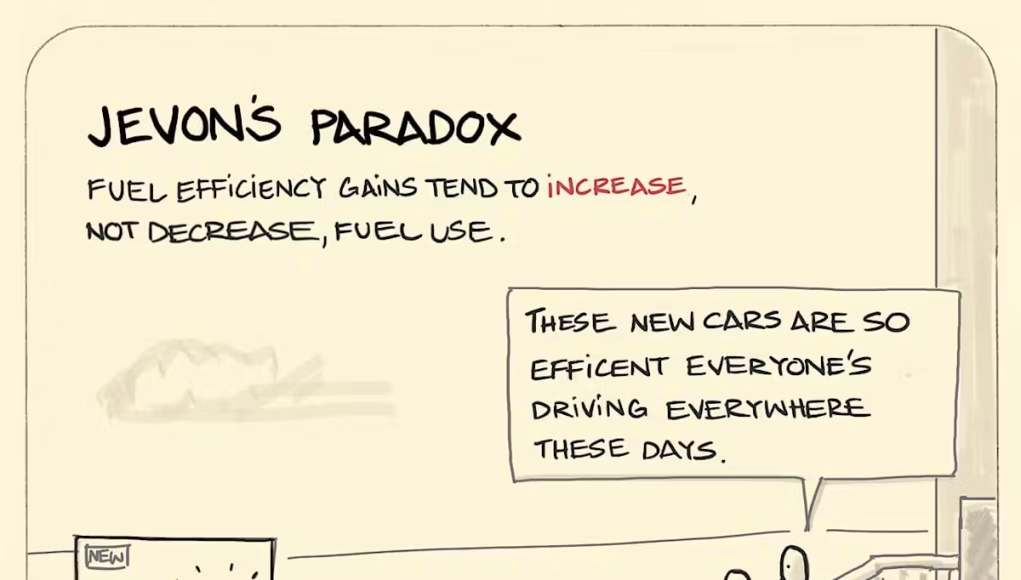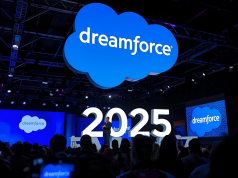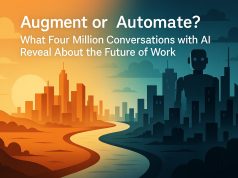In 1865, British economist William Stanley Jevons made an observation that would later be known as Jevons Paradox: as coal-burning technologies became more efficient, coal consumption didn’t decrease—it surged. Lower costs and greater accessibility drove more demand, offsetting the savings from efficiency.
Today, as the Chinese AI company DeepSeek introduces a revolutionary AI model that runs on a laptop and costs a fraction of what competitors charge, major AI firms are citing Jevons Paradox to reassure investors. “Cheaper AI means more AI usage,” they argue, “so demand will keep rising.”
But this isn’t a simple case of efficiency driving growth. DeepSeek is not just increasing efficiency—it’s destroying business models. And that’s a problem Jevons Paradox can’t fix.
Jevons Paradox Assumes Stability—DeepSeek Brings Chaos
For Jevons Paradox to hold, three conditions must generally be true:
- The Market Structure Remains Intact – A more efficient version of the same product leads to more consumption. Think of cars: better fuel efficiency made driving cheaper, so people drove more, increasing total fuel consumption.
- The Resource Remains Scarce or Costly – The efficiency savings don’t eliminate the need for the resource itself, just make it more accessible.
- The Demand Curve Expands but Doesn’t Shift Ownership – More people buy a cheaper product, but the major players selling that product still benefit.
DeepSeek breaks all three assumptions:
- It isn’t just making AI cheaper—it’s making it effectively free. That’s not the same as reducing coal costs by 20%. That’s closer to giving away solar panels that generate unlimited energy.
- It isn’t increasing demand for centralized AI infrastructure—it’s making decentralized AI viable. If AI models run on laptops, why pay for cloud services?
- It isn’t just boosting consumption—it’s shifting power. The biggest AI companies built their businesses on selling access to proprietary models. DeepSeek just made AI an open-source public good.
Jevons Paradox predicts that efficiency increases demand, but it doesn’t predict what happens when efficiency wipes out an entire industry’s value proposition.
AI Giants Are Hoping for an Oil Boom—They Might Get a Napster Moment Instead
When OpenAI, Google, and other AI leaders tell investors, “Don’t worry, cheaper AI means more AI, and that’s good for us,” they’re making the classic mistake of confusing industry growth with company success.
Let’s compare it to two historical disruptions:
- The Oil Boom (Jevons Paradox in Action)
- The internal combustion engine became more efficient.
- That made gasoline cheaper.
- Car ownership skyrocketed.
- Oil companies made a fortune as global fuel demand surged.
- The Napster Moment (Market Disruption, Not Just Efficiency)
- In the late ‘90s, the music industry sold CDs for $15 each.
- Then Napster made music effectively free.
- Music consumption exploded—but record labels lost control over distribution.
- The industry never recovered its previous profit margins.
DeepSeek is looking more like Napster than an oil boom. AI consumption will increase, but not in a way that preserves the dominance of today’s biggest AI companies.
The Future: Decentralization, Fragmentation, and the Collapse of AI Monopolies
1. AI Moves From Centralized Clouds to Personal Devices
Big AI models require massive cloud computing resources, which is why companies like OpenAI and Google have been investing billions in data centers. But if DeepSeek (and future open-source models) can run efficiently on a laptop, the need for centralized AI services diminishes.
That means:
✅ More people using AI
❌ Fewer people paying OpenAI or Google for access
2. Open-Source AI Means Anyone Can Compete
If AI models are open-source and can be improved by anyone, why rely on a handful of companies? The monopoly on AI development breaks, and smaller players start competing with customized solutions.
That means:
✅ More AI innovation
❌ Less market control for the biggest firms
3. Energy Demand May Not Skyrocket After All
A key argument for Jevons Paradox applying to AI is that “cheaper AI means more AI, so energy demand will keep rising.” That assumes AI remains cloud-based. But if AI runs locally, that might reduce the need for large-scale cloud computing, slowing energy demand growth.
That means:
✅ More AI applications
❌ A more decentralized energy impact than expected
The Real Risk: AI Eating Itself
There’s a bigger, darker consequence of hyper-efficient AI proliferation: the collapse of human-generated knowledge.
DeepSeek enables AI models to spread faster and more cheaply than ever, but AI still depends on human-generated knowledge to stay useful. If professional writers, researchers, and experts get replaced before AI can fully sustain itself, the system starts feeding on its own regurgitated data.
Imagine Wikipedia if humans stopped editing it, and bots just kept rewriting existing pages indefinitely. Over time, errors compound. Meaning is lost. The signal collapses into noise.
That’s the risk when AI replaces, rather than augments, human expertise.
Final Thoughts: Jevons Paradox Won’t Bail Out the AI Giants
Yes, AI consumption is about to explode.
Yes, it will reach industries and applications previously untouched.
But no—this won’t save OpenAI, Google, and the other AI incumbents.
Jevons Paradox assumes demand increases benefit existing suppliers. But when efficiency destroys pricing power, decentralizes technology, and reshapes industry economics, demand growth doesn’t mean profit growth.
The AI revolution is just beginning.
But the AI empires we know today?
Their best days might already be behind them.


























![The Economics of a Disrupted Workforce: When the Bet on Bots Backfires [Part1] When the Bet on Bots Backfires: The Economics of a Disrupted Workforce](https://theworktimes.com/wp-content/uploads/2025/05/ChatGPT-Image-May-20-2025-03_51_39-PM-100x75.png)

